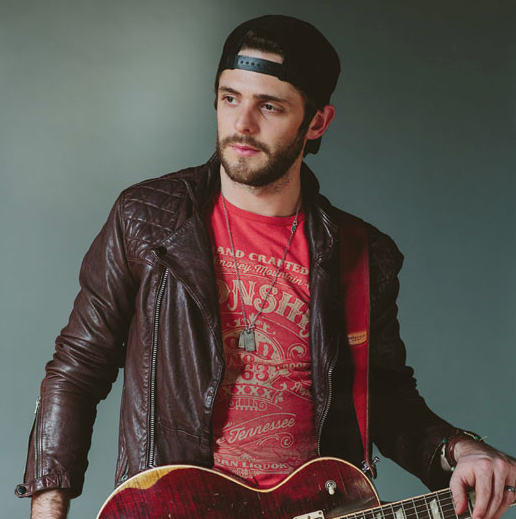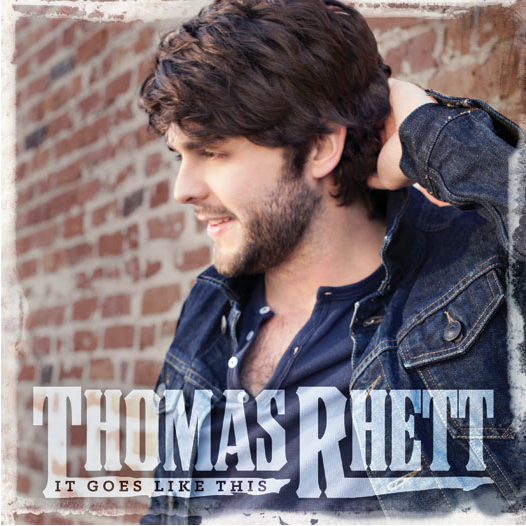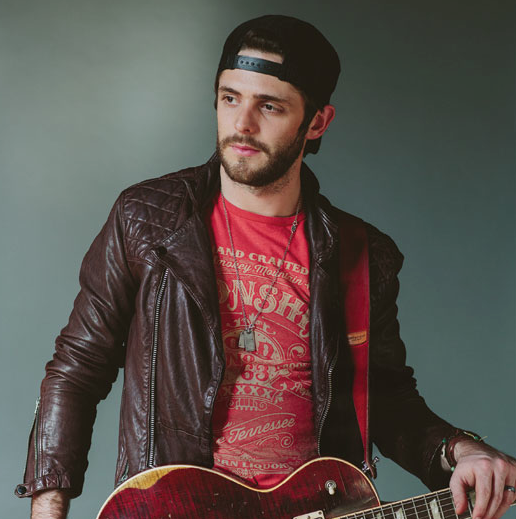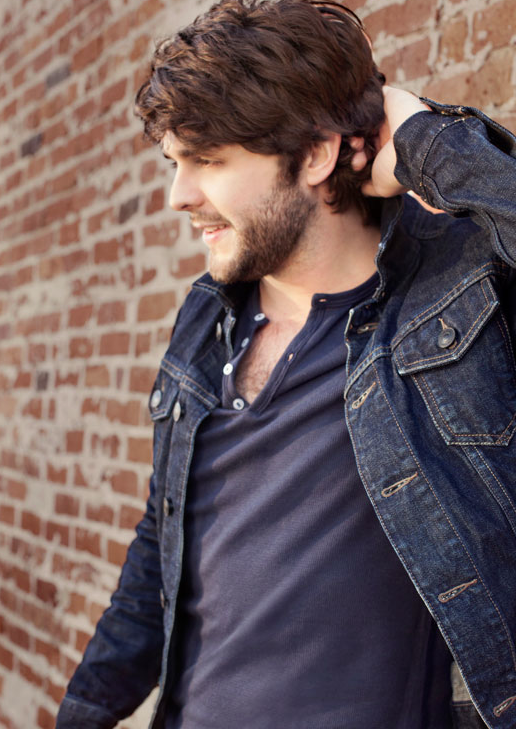Thomas Rhett on His Next Album, Picking Style and Being a Well-Rounded Musician

Becoming a country music singer wasn’t high on Thomas Rhett’s list of priorities when he moved to Nashville.
Born and raised in Georgia, Rhett played guitar and sang, and tested the music-industry waters by spending time on the road with his father, singer/songwriter Rhett Akins.
By the time he joined his dad full time in Tennessee, he was focused on attending college and content to gig locally with a cover band.
His father, however, had other plans. He convinced Thomas to perform at a showcase, and shortly thereafter, EMI signed him to a publishing deal. Partnered with other songwriters, including Rhett Akins, Thomas Rhett began landing cuts on other artists’ albums—among them Jason Aldean, Lee Brice and Florida Georgia Line—and signed a record deal of his own in 2011. His debut album, It Goes Like This, was released in October 2013.
Rhett recently became the second solo male artist, and the first since 1994, to land three Number 1 singles from a full-length debut album on Billboard’s Country Airplay chart, with “Make Me Wanna” following “Get Me Some of That” and “It Goes Like This.” He is a nominee for ACM New Artist of the Year and is on tour with Florida Georgia Line.
GUITAR WORLD: You are coming off of a very successful debut. How will your second album be the next step?
I think, for every artist, the second album is the most terrifying one to put out because it can either boost your career and everybody can’t wait until your third album, or the second one is terrible and, “He probably hit a plateau on his first one.”
Get The Pick Newsletter
All the latest guitar news, interviews, lessons, reviews, deals and more, direct to your inbox!
So every artist thinks about that, but I’m so confident in the direction we’re headed, and in the songs we have, that I don’t see how it’s possible for this record to be bad. I think it’s going to be awesome. Just hearing five or six songs from the stuff we’ve already done, it feels big, it feels different and it feels like me for the first time. It feels like every song we’ve done is one that I 100 percent want, and the label 100 percent wants. That’s a good feeling, knowing that your label is giving you the freedom to do what you want to do.
How did you develop your picking and playing style?
Probably the same way a bunch of kids did. When I was 12 or 13, my dad taught me a couple of different chords, and once I learned chords, I never learned to read music, but I learned tablature, like a lot of kids do, and I learned songs that had the chords I knew.
It took me a long time to understand the upstroke of picking and strumming, but once I did, it all fell into place. The next step for me was learning how to sing and play, and that took me a little while, but once I did, it was a pretty natural process.
How would you describe the dynamic between you and your band members? [Rhett’s band features Travis Vance, bass; Eric Borash, lead guitar; Chris Kimmerer, drums; and Josh Reedy, keyboards/guitar.]
Everybody besides my piano player has been with me since the very first day. We were a four-piece band for a solid two years. It was me playing acoustic and rhythm electric guitar, a bass player, a drummer and a lead guitar player. For a couple of years we sounded like the Foo Fighters. Everybody turned their instrument up to 12 and tried to find the best mix out of the PA.
We were a straight-up country music rock band. There was no banjo, no piano, only one background singer and one lead singer. Last year we hired a guy who plays keyboards, synths and guitar, and now we have two background singers, so it definitely added to the dynamic of the band. We talked about, “Do we want a sixth guy for next year?” and we all agreed we have such a cool dynamic with the five of us that we’re set.
For as long as I’m going to be an artist, it’s going to be me and these four other dudes onstage, and I love it that way. There’s something old school and organic about having not a whole lot of people onstage. I’ve come to love it and love the guys I play with.
You also play drums. Does that help you build the groove as a songwriter and recording artist?
Oh, totally. Drums was the first instrument I learned to play, and I can dabble on piano and bass. Sometimes I get on the drums or the piano, follow along and try to be decent at what we’re doing! I love switching it up like that. When I’m writing songs with people who are only knowledgeable on guitar or piano, having that beat knowledge helps my demos a lot and helps on my records.
I’m probably one of the only people that goes in to my producer and says, “Hey, we need to change that drum fill,” or “We need to change the tone of that B3 sound,” or “We need more delay or tremolo on the electric part.” I think it makes me more well-rounded as far as playing shows and, alternately, being in the studio tracking a record or a demo. The fact that I know enough abut all those instruments makes me know how a song should sound and what to put in it to make the song more cohesive. I think it’s made me more of a well-rounded person in the studio overall.
When you write, whether for yourself or other artists, do you have to “think radio,” or think “country radio,” whatever that means now?
Yeah, and I think that’s what’s on every songwriter’s mind. When you finish a song, your first thought is going to be, Is this song a hit? I hate that we think that way, because it kind of takes a little bit of the meaning out of the songs that are being written, but you’re definitely going to think, Can this song be put on the radio? And if not, my second thought is, How is this going to translate in our live show? Where is it going to come into the set, and where is it going to be on the album? Is it going to make the album flow, or is it going to put a weird dent in it? So I just try to write a great song. Whether it’s a ballad or a feel-good song or a melodic song, I want it to be well written.
You’ve been on tour with so many A-list artists. How has that helped you become a better performer?
I’ve been lucky to have toured with people like Miranda Lambert, Jason Aldean, Toby Keith, Justin Moore and Luke Bryan. I’ve gotten to play shows with the biggest and best. We played at Wrigley Field, Fenway Park, the Hollywood Bowl and Madison Square Garden. Watching Jason play at the Hollywood Bowl or headline two nights at Fenway Park—to me, that screams superstar. That means you have officially made it and you are staying around in the big leagues.
Obviously, I learned what a stage should look like, as far as production and lights and pyro to catch your fans’ eyes, but at the same time, one of the big things I’ve learned is the backstage experience, seeing how all of those artists treat their middle-slot and opening-slot acts.
A lot of times, being an opener like we have been, we’re like the freshmen in high school. A lot of people don’t know if they should take you seriously or not, because you’re young, you’re only playing for 20 minutes a night, and you only have one bus. But they have all treated us so awesomely that it’s a great example for me.
If I’m someday headlining my own shows, I know how to treat my opening acts and how to make backstage a very homey place. You can get pretty worn down being away from home, and any way that we can make the backstage experience better for middle and opening acts, we want to do that. I’ve learned a lot from those guys. Production, what to say to a crowd, and how to make backstage a better experience are three of the things.
Alison Richter interviews artists, producers, engineers and other music industry professionals for print and online publications. Read more of her interviews at examiner.com.



Alison Richter is a seasoned journalist who interviews musicians, producers, engineers, and other industry professionals, and covers mental health issues for GuitarWorld.com. Writing credits include a wide range of publications, including GuitarWorld.com, MusicRadar.com, Bass Player, TNAG Connoisseur, Reverb, Music Industry News, Acoustic, Drummer, Guitar.com, Gearphoria, She Shreds, Guitar Girl, and Collectible Guitar.
“The rest of the world didn't know that the world's greatest guitarist was playing a weekend gig at this place in Chelmsford”: The Aristocrats' Bryan Beller recalls the moment he met Guthrie Govan and formed a new kind of supergroup
Carlos Santana hospitalized following pre-show medical emergency


![[from left] George Harrison with his Gretsch Country Gentleman, Norman Harris of Norman's Rare Guitars holds a gold-top Les Paul, John Fogerty with his legendary 1969 Rickenbacker](https://cdn.mos.cms.futurecdn.net/TuH3nuhn9etqjdn5sy4ntW.jpg)







